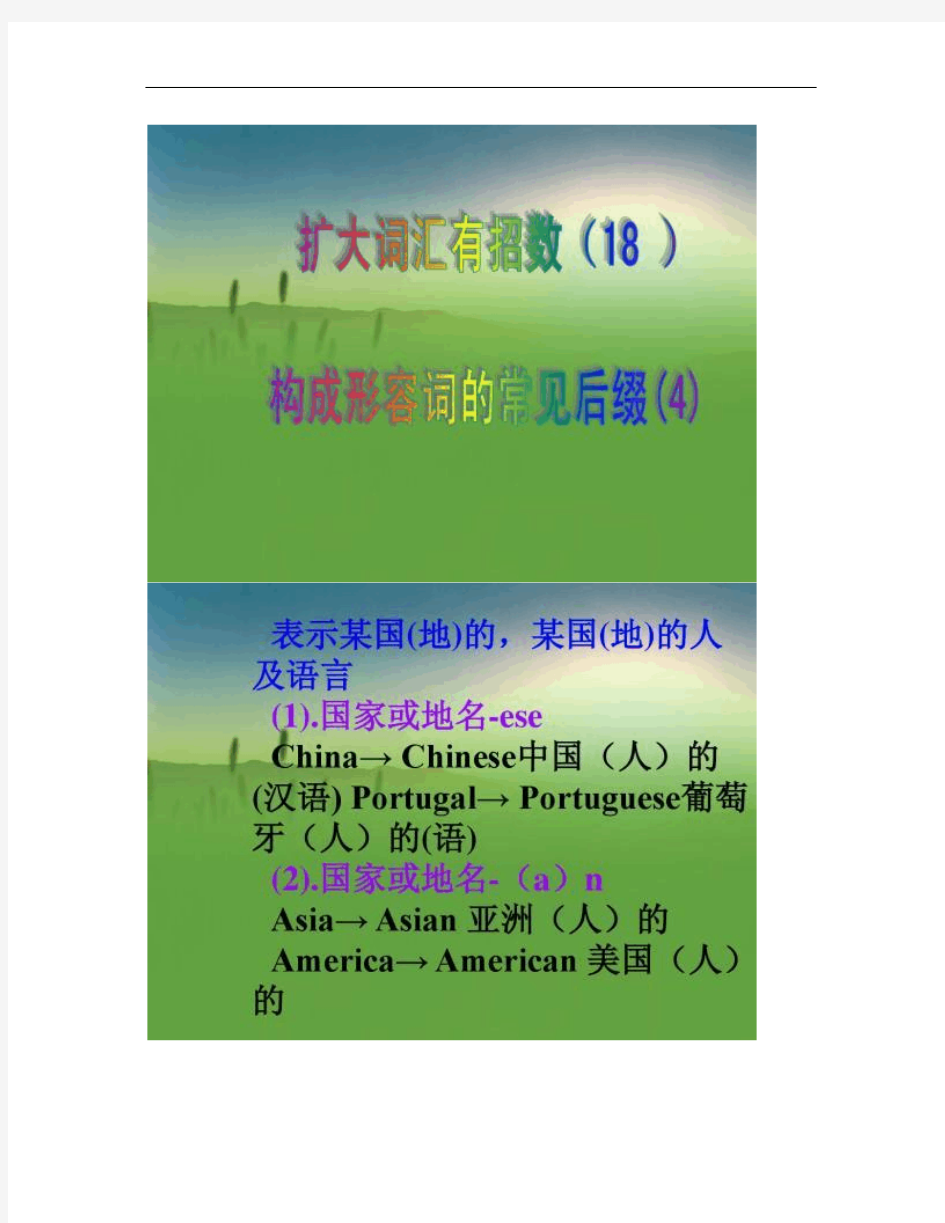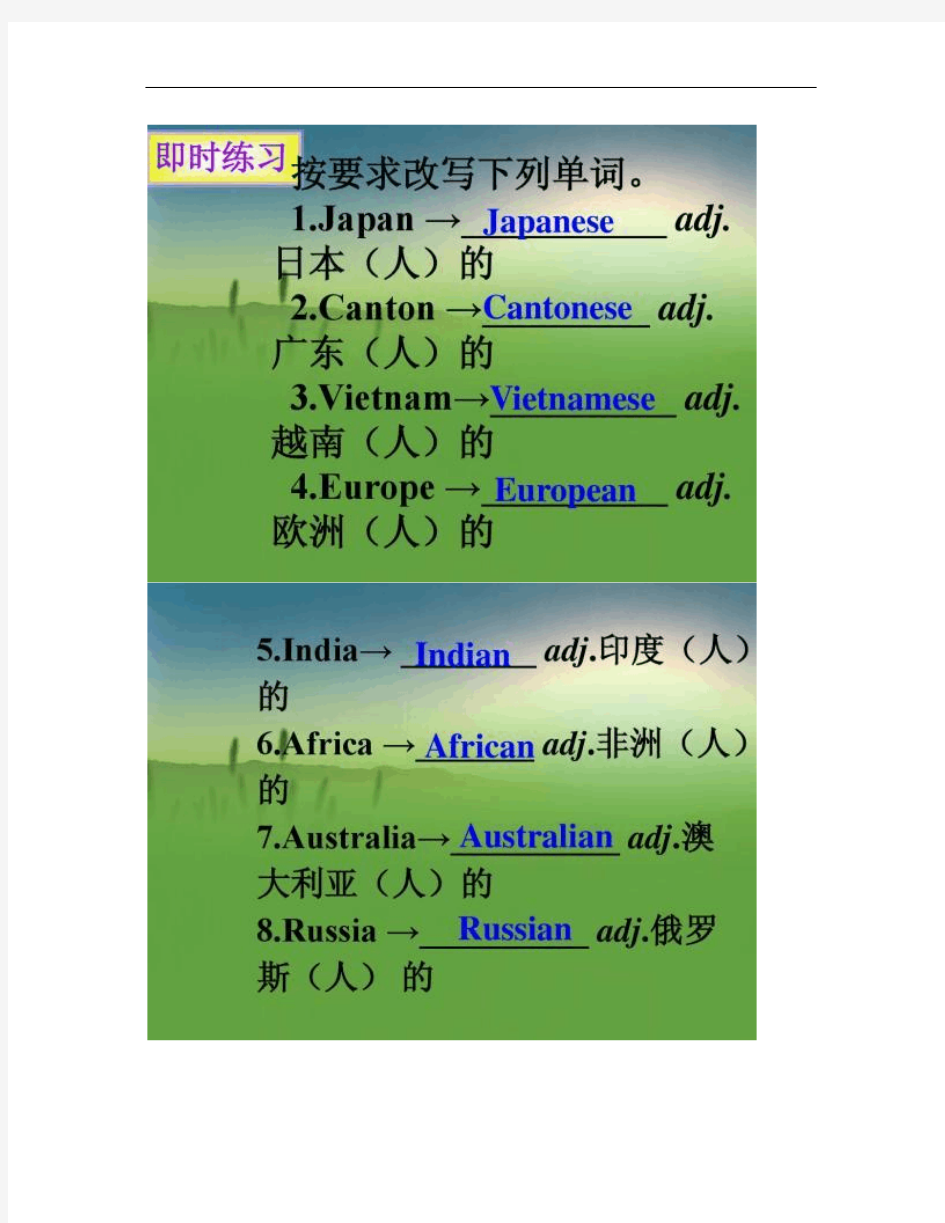构成形容词的常见后缀(4)


(完整word版)常见形容词词缀
常见形容词词缀 1.-able 以“-able”结尾的形容词一般有两种情况: (1)v.+able→adj. 以这种方式构成的形容词其意义为“能……的”、“可以(被)……的”、“适合于……的”、“值得……的”等,即有被动含义。例如:reliable(可以依靠的),drinkable (可以饮用的),eatable(可食用的)。 (2)n.+able→adj. 这种形容词意为“具有……特点的”,如valuable(有价值的),reasonable (有道理的),comfortable(舒适的)。 2.-ible 该词缀在意义上与“-able”相同,但主要用于拉丁语后。例如:terrible,horrible,invi sible,possible。 3.-al 该词缀大多是加在名词后形成形容词的。不过,有些“-al”后缀则仅体现了该词的形容词性,并非以这种方式构成形容词。“-al”意为“属于……的”、“有……特性的”。这类词在中学英语中颇多,如actual,general,international,medical,mental,moral,natural,official,several,special,usual。(这类形容词大部分没有比较级和最高级) 4.-an “-an”加在国名、地名之后,表明是相应的形容词,如American,African。 5.-ian “-ian”与“-an”相同。例如:Asian,Australian,Canadian,Indian,Italian。 6.-ant “-ant”表示“……性的”。带“-ant”后缀的形容词其相应名词往往是-ance或-ancy 后缀。例如:instant(instance),distant(distance),important(importance),brilliant(brilliancy),consta nt(constancy),pleasant。 7.-ent “-ent”与“-ant”非常相似。例如:absent(absence),different(difference),excelle nt(excellence),patient(patience),present(presence). 8.-ar “-ar”意为“……的”、“……性的”,如popular,particular,regular。 9.-ary “-ary”意为“……的”、“与……有关的”。例如:contrary,necessary,ordinary,prim ary,revolutionary。 10.-ed “-ed”加在动词之后形成形容词。实际上该形容词是由原动词的过去分词演变而来的,因此它有被动含义。这种形容词在中学英语中出现很多,有connected,discouraged,disappointed,engaged,exc ited,interested,limited,married,pleased,tired,united,used(习惯的),worried,wounded。 “-ed”也可加在动词之后形成复合形容词,如man-made,water-covered。 “-ed”还可加在名词之后形成复合形容词,如warm-hearted,warm-blooded,three-legged。11.-en “-en”有两种情况: (1)“-en”跟在一些物质名词之后构成形容词,表示“材料”或“质地”,如wooden,golden,earthe n。 (2)“-en”也可加在一些不规则动词之后形成形容词。这些形容词实际上是由过去分词转换而来的。例如:spoken,written,stricken,mistaken。 12.-ern “-ern”加在表示方位的名词之后,表示“……(方位)的”。这样的词有eastern,sout hern,western,northern等。 13.-ese “-ese”加在国名、地名之后构成相应形容词。例如:Chinese,Japanese. 14.-ful 这一后缀有两种情况: (1)加在名词之后构成形容词,表示“充满……的”、“有……性质的”,如beautiful,colourful,he lpful,powerful,successful,useful,wonderful。 (2)加在动词之后,所构成的形容词意为“易于……的”,如forgetful。 15.-ic “-ic”常常加在名词或依附于词干后,构成形容词,意为“……的”、“……似的”、
常见名词后缀总结教学教材
常见名词后缀总结
常见名词后缀总结 (1)具有某种职业或动作的人 1)-an, -ian, 表示"……地方的人,精通……的人,信仰……教的人,从事……职业的人“American, historian, Christian, physician(内科医生),musician 2)-al, 表示"具有……职务的人" principal 3)-ant, -ent, 表示"……者 “ merchant, agent, servant, student 4)-ar, -er表示"……的人“ scholar, liar, peddler (小贩)
5)-ard, -art, 表示"做……的人“coward, laggard (落后者), braggart (夸张者) 6)-arian, 表示"……派别的人,……主义的人“humanitarian, vegetarian 7)-ary, 表示"从事……的人" secretary, missionary 8)-ate, 表示"具有……职责的人" candidate, graduate 9)-ator, 表示"做……的人" educator, speculator(投机者), spectator, translator, visitor, inventor 10)-crat, 表示"某种政体、主义的支持者" democrat 民主党人,
(republic an共和党人)bureaucrat 官僚主义者 11)-ee, 表示"动作承受者" employee, examinee,payee (payer) 12)-eer, 表示"从事于……人" engineer, volunteer, mountaineer 13)-er, 表示"从事某种职业的人, 某地区,地方的人" banker, observer, Londoner, villager, New Yorker 14)-ese, 表示" ……国人,………地方的人“Japanese, Cantonese 广东人,广东话, Chinese, Japanese
初中 最常见词根词缀总结
初中常用词根词缀总结 前缀 1、ab--表示反常,否定,离开abnormal absent 2、ante--在.......之前anteroom antecedent 3、anti--防止,反对antiwar antifreeze 4、auto--自动的automobile autorun 5、bi--两个,双bicycle bilateral 6、co--一起,共同cooperate coexist 7、com--一起,共同combine compete 8、contra--相反contrast contradict 9、de--往下,离开,减少decrease devalue 10、dis--表示否定dislike disappear 11、ex--向外,以前的export ex-wife 12、extra--超过extraordinary 13、fore--在......之前forehead foresee 14、hemi--一半hemisphere hemicycle 15、homo--相同的homosexual 16、il--表示否定illegal illiterate 17、im--表示否定impossible impolite 18、in--表示向内,也表否定indoor independent 19、inter--在.......之间,彼此international interchange 20、ir--表示否定irregular irrelative 21、kilo--千(构成名词,常用于计量单位)kilometer kilogram 22、mid--中,中部midnight midlife 23、mini--小的,迷你的miniskirt ministate 24、mis--坏的,错误misuse mistake 25、non--表示否定nonstop nonhuman 26、out--外面,超过outgoing outsize 27、over--过度,覆盖overwork overcoat 28、pre--在........之前prehistory preschool 29、re--重复,重新rebuilt reconsider 30、step--后,继的stepfather stepchild 1
形容词后缀大全
(1)带有“属性,倾向,相关”的含义 1)-able, -ible, movable, comfortable, applicable, visible, responsible 2)-al, natural, additional, educational 3)-an, ane, urban, suburban, republican 4)-ant, -ent, distant, important, excellent 5)-ar, similar, popular, regular 6)-ary, military, voluntary 7)-ice, -atie, ical, politic, systematic, historic, physical, 8)-ine, masculine, feminine, marine 9)-ing, moving, touching, daring 10)-ish, foolish, bookish, selfish 11)-ive, active, impressive, decisive 12)-ory, satisfactory, compulsory 13)-il, -ile, -eel, fragile, genteel(文雅的) (2) 表示“相象,类似”的含义 1)-ish, boyish, childish 2)-esque, picturesque 3)-like, manlike, childlike 4)-ly, manly, fatherly, scholarly, motherly 5)-some, troublesome, handsome 6)-y, milky, pasty (3) 表示“充分的”含义 1)-ful, beautiful, wonderful, helpful, truthful 2)-ous, dangerous, generous, courageous, various 3)-ent, violent
英语单词常见前后缀总结
英语单词常见前后缀总结背单词必看 *******前缀********* a,an ①无,不,非 astable不稳定的 acentric无中心的 ②含有in,on,at,by,with,to等意义asleep在熟睡中 ahead向前ab脱离 abnormal不正常的 abaxial离开轴心的 anti反抗 antiwar反战的 anti imperialist反帝的 auto自动,自己 autobiography自传 autostable自动稳定 be使…加强 belittle使缩小 befriend友好相待 bi二,双 biweekly双周刊 biligual两种语言的 co,col,com,con,cor 共同 cooperation协作 collaboration协作,勾结 combine联合 correlation相互关系 counter,contra反,对应 counteraction反作用 contrast对比,对照 di,dif,dis否定,相反 diffident不自信的 dislike不喜欢en,em使… enlarge扩大 enable使…能 empower使…有权力 e,ex外,出 external外部的 erupt喷出 extra以外,超过 extraordinary格外的 extrasolar太阳系以外的 hyper在上,超 hyperfrequency超高频 hypersonic超声的 il,im,in,ir否定 illogical不合逻辑的 impossible不
可能的 invisible 不可见irrational不合理的 inter互相 interchange交换 interlock连锁 intra,intro在内,内部intrapersonal个人内心的introspect内省 mal恶,不良 maltreat虐待 malfunction机能失常 micro显微镜 microware微波 mid中,中间 mid air半空中 midstream中流 mini小 minibus小公共汽车 ministate小国 mis错,坏 mistake错误 misspell拼错 multi多 multiparty多党的 multilingual多种语言的 non否定 nonsmoker不抽烟的人 nonexistent不存在的 out超过,过度,外,出,除去 outgo走得比…远 outgrow长得太大 outdoor户外的 outroot除根over上,过度 overwork工作过度 overbridge天桥 post后 postwar战后 postnatal诞生后的 pre前,领先 prewar战前的 prefix前缀 re回,再 return返回 restart重新开始 semi半 semicircle半圆 semiconductor半导体 sub,suc,suf,sup次,亚,在下,低于 substandard低于标准规格的succeed继承suffix后缀supplement增补
(完整版)26种英语形容词后缀讲解
26种英语形容词后缀讲解 ◆-able 以“-able”结尾的形容词一般有两种情况: (1)v.+able→adj. 以这种方式构成的形容词其意义为“能……的”、“可以(被)……的”、“适合于……的”、“值得……的”等,即有被动含义。例如:reliable(可以依靠的),drinkable (可以饮用的),eatable(可食用的)。 (2)n.+able→adj. 这种形容词意为“具有……特点的”,如valuable(有价值的),reasonable(有道理的),comfortable (舒适的)。 ◆-ible 该词缀在意义上与“-able”相同,但主要用于拉丁语 后。例如:terrible,horrible,invi sible,possible。 ◆-al 该词缀大多是加在名词后形成形容词的。不过,有些“-al”后缀则仅体现了该词的形容词性,并非以这种方式构成形容词。“-al”意为“属于……的”、“有……特性的”。这类词在中学 英语中颇多,如 actual,general,international,medical,mental,moral,natural, official,several,special,usual。(这类形容词大部分没有比较 级和最高级) ◆-an “-an”加在国名、地名之后,表明是相应的形容词,如 American,African。 ◆-ian “-ian”与“-an”相同。例如: Asian,Australian,Canadian,Indian,Italian。
◆-ant “-ant”表示“……性的”。带“-ant”后缀的形容词其相 应名词往往是-ance或-ancy后缀。例如:instant(instance),distant(distance),important(importance), brilliant(brilliancy),consta nt(constancy),pleasant。 ◆-ent “-ent”与“-ant”非常相似。例如: absent(absence),different(difference),excelle nt(excellence),patient(patience),present(presence). ◆-ar “-ar”意为“……的”、“……性的”,如 popular,particular,regular。 ◆-ary “-ary”意为“……的”、“与……有关的”。例如: contrary,necessary,ordinary,prim ary,revolutionary。 ◆-ed “-ed”加在动词之后形成形容词。实际上该形容词是由原动词的过去分词演变而来的,因此它有被动含义。这种形容 词在中学英语中出现很多,有 connected,discouraged,disappointed,engaged,exc ited,interested,limited,married,pleased,tired,united,used (习惯的),worried,wounded。 “-ed”也可加在动词之后形成复合形容词,如 man-made,water-covered。 “-ed”还可加在名词之后形成复合形容词,如 warm-hearted,warm-blooded,three-legged。 ◆-en “-en”有两种情况:
英语常见名词后缀(最全)
名词后缀 一、具有某种职业或动作的人 1)-an,-ian,表示"……地方的人,精通……的人”American,historian, 2)-al,表示"具有……职务的人" principal, 3)-ant,-ent,表示"……者” merchant,agent,servant,student, 4)-ar,表示"……的人” scholar,liar,peddler 5)-ard,-art,表示"做……的人”coward,laggard,braggart(夸张者) 6)-arian,表示"……派别的人,……主义的人”humanitarian,vegetarian 7)-ary,表示"从事……的人" secretary,missionary 8)-ate,表示"具有……职责的人" candidate,graduate 9)-ator,表示"做……的人" educator,speculator(投机者) 10)-crat,表示"某种政体,主义的支持者" democrat,bureaucrat 11)-ee,表示"动作承受者" employee,examinee 12)-eer,表示"从事于……人" engineer,volunteer 13)-er,表示"从事某种职业的人,某地区,地方的人" banker,observer,Londoner,villager 14)-ese,表示" ……国人,…..地方的人”Japanese,Cantonese 15)-ess,表示"阴性人称名词,actress,hostess,manageress 16)-eur,表示"……家” amateur,littérateur 17)-ian,表示"……地方人,信仰…….教的人,从事……职业的 人”Christian,physician(内科医生),musician 18)-ician,表示"精通者,……家,”electrician,magician,technician 19)-icist,表示"……家,…….者,…….能手”physicist,phoneticist,technicist 20)-ic,表示"……者,……师" mechanic,critic 21)-ie,表示"爱,指小" dearie,auntie,lassie(小姑娘) 22)-ier,表示"从事……职业” cavali er,clothier,brazier(黄铜匠) 23)-ine,ian,表示"阴性人称" heroine,ballerina 24)-ist,表示"从事……研究者,信仰……主义者" pianist,communist,dentist,artist,chemist 25)-ive,表示"动作者,行为者” native,captive 26)-logist,表示"……学家,研究者" biologist,geologist(地质学家) 27)-or,表示"……者" author,doctor,operator, 28)-ster,表示"做…….事情的人”youngster,gamester(赌徒),songster 29)-yer,表示" 从事……职业者” lawyer
专题12 后缀词的主要构成方式(3)形容词(原卷版)
2020年高考英语词汇解题妙招 专题12后缀词的主要构成方式(3)形容词(原卷版)由词根(或单词) 附加前缀、后缀构成新词的方法叫派生法。由派生法构成的词叫派生词. 大体上讲,派生法有两种:加前缀、加后缀。本讲对后缀(suffix)进行概述。专讲后缀构成的形容词. 我们大家给非常熟悉的“老朋友”加上新的后缀, 就构成了很多“新朋友”了, 让我们先从整体上重新认识他们吧。详细内容如下: 根据下划线词在句中所作句子成分, 判断其词性及其意义。 1. How does the woman fee l about James’ situation? A. Embarrassed. B. Concerned. C. Disappointed.(2019年普通高等学校招生全国统一考试(全国卷I)) 【答案】adj. 有关的;关心的 【解析】原本concern是vt. 影响,牵扯(某人);关系到,涉及;使担心; n. 担心,忧虑;关爱,关心;关心的事,负责的事;关系;公司,企业;(非正式)复杂的物体 后缀--ed的用法: 加了ed以后是过去分词,可以做定语,所以成了形容词。比如,interested, excited等等。 2. But he’s nervous."I’m here to tell you today why you should … should…"Chris trips on the"-ld,"a pronunciation difficulty for many non-native English speakers.(2019年普通高等学校招生全国统一考试(全国卷I)) 【答案】adj. 神经的;紧张不安的;强健有力的 比较级more nervous最高级most nervous 【解析】原本nerve是n. 神经;勇气;[植] 叶脉; 复数nerves; vt. 鼓起勇气; 过去式nerved过去分词nerved 现在分词nerving第三人称单数nerves.在此其后加ous构成一个形容词。---ous形容词标志,通常放在一个完整的单词后,表示“…的” 例如: dangerous 危险的; mountainous 多山的;巨大的;山一般的; poisonous 有毒的;有害的;恶意的;<口>讨厌的; 3. Learning English as a second language can be a painful experience.(2019年普通高等学校招生全国统一考试(全国卷I)) 【答案】adj. 痛苦的;疼痛的;令人不快的;比较级more painful最高级most painful
形容词后缀大全以及词例教学文案
形容词后缀大全以及 词例
形容词后缀大全以及词例 1.-able 表示“可…的,能…” 【例】 knowable ['n?u?bl] adj. 可知的 inflammable [?n'fl?m?b(?)l] adj. 易燃的(inflame点燃)conceivable [k?n'si?v?b(?)l] adj. 想象得出的(conceive 设想,想象) 2.-aceous 表示“具有…特征的” 【例】 herbaceous [h??'be???s] adj. 草本植物的(herb草) curvaceous [k??'ve???s] adj. 有曲线美的(curve曲线) foliaceous [,f??l?'e???s] adj. 叶状的(foli 叶+aceous;参考:foliage树叶) 3.-acious 表示“有特征的,多…的” 【例】 sagacious [s?'ge???s] adj. 睿智的(sage智者)
capacious [k?'pe???s] adj. 宽敞的(cap能→的+acious;参考:capble 有能力的) fallacious [f?'le???s] adj. 错误的(fall错;参考:fallacy谬误) 4.-al 表示“…的” 【例】 personal ['p??s(?)n(?)l] adj. 个人的(person人) continertal [k?nt?'nent(?)l] adj. 大陆的(contonent大陆)exceptional [?k'sep?(?)n(?)l] adj. 例外的(exception例外) 5.-an 可表名词和形容词,“…地方,.…人 【例】 American [?mer?k?n] adj. 美洲的 n. 美洲人 republican [r?'p?bl?k(?)n] adj. 共和国的 n.共和党人 suburban [s?'b??b(?)n] adj. 郊区的 6.-aneors 表示“…有;…特征的” 【例】 simultaneous [,s?m(?)l'te?n??s] adj. 同时发生的
形容词性后缀
后缀通常改变词性,构成意思相近的其它词性的词;少数后缀同时会改变词义。 A.形容词性后缀: 例:nation→national 民族的,国家的;nature→natural 自然的 equal平等的;special特别的;central中心的;agricultural农业的;electrical电的;facial面部的;fundamental 基本的;global全球的;personal个人的;racial种族的;spiritural精神的;theoretical理论的;typical典型的;mental心理的,智力的 表示“有能力的”例:eat→eatable 能吃的 adjustable: adjust (v. 调节) + -able àadj. “able to be adjusted可调节的”; respectable: respect(v. 尊敬) + -able àadj. “able to be respected可敬的”; adaptable: suit(v. 使适应) + -able àadj. “able to be adapted 可适应的”; 2.-able 加在“变形动词”的后面 applicable: apply(v. 应用) + -able àadj. “可应用的” deniable: deny(v. 否认) + -able àadj. “可否认的” triable: try(v. 尝试) + -able àadj. “可试验的” usable: use(v. 使用) + -able àadj. “可用的,合用的” 3.-able 有时与名词结合,表示“给予…的”,“值得…的” fashionable adj. 时尚的,时髦的 lovable adj. 可爱的 reasonable adj. 合理的 4. –able 后面加上不及物动词,构成的形容词有主动含义 agreeable: agree(vi.同意) + -able àadj. 欣然同意的,惬意的 reliable: rely(vi.依靠) + -able àadj. 可靠的 shrinkable: shrink(vi.缩水) + -able àadj. 会收缩的 variable: vary(vi.变化) + -able àadj. 可变化的 5. –able 加在词根后面 capable: cap-(to hold) + -able àadj. 有能力的 durable: dur-(to last持续) + -able àadj. 持久的 6. –ible 加上“动词词根”构成形容词 tangible: tang-(/tact- = to touch) + -ible àadj. that can be perceived by touch可触摸的visible: vis(= to see) + -ible àadj. that can be seen 可见的 terrible: terr(= to frighten) + -ible àadj. that can be frightened 可怕的 negligible: neglig(=neglect 忽略) + -ible àadj. that can be neglected 可忽略的 ian 表示“国家的,国家人的”。例:America→American 美国(人)的African(非洲人),American (美国人),Asian(亚洲人),Japanese(日本人),Chinese(中国人) 表示“方向的”。例:east→eastern东方的,south→southern南方的 northeastern a. 东北方的,在东北的,来自东北的northern a.北方的,北部的northwestern a. 在西北部的,西北方的,来自西北的southeastern a. 东南方的southern adj.南方的,南部的southwestern 例:beauty→beautiful 美丽的,care→careful 小心的 awful糟糕的可怕的wonderful好极的,精彩的careful小心的helpful有帮助的 useful有用的meaningful 有意义的beautiful漂亮的
常用英语形容词后缀
形容词后缀(1)带有"属性,倾向,相关"的含义 1) -able, -ible, movable, comfortable, applicable, visible, responsible 可移动的舒服的适当可应用明显可得到责任心 2) -al, natural, additional, educational, physical, 自然天生额外附加教育身体自然界 3) -an, ane, urban, suburban, republican 都市城郊土气共和国政体 4) -ant, -ent, distant, important, excellent 遥远冷漠不清晰重要卓越 5) -ar, similar, popular, regular 相似受欢迎规律 6) -ary, military, voluntary 军事好战自愿有意 7) -ice, -atie, ical, politic, systematic, historic, 谨慎有见识系统一贯历史 8) -ine, masculine, feminine, marine 有男子气概女孩子气海产海军 9) -ing, moving, touching, daring 感动可移动同情感人胆大意气风发勇敢 10) -ish, foolish, bookish, selfish, boyish, childish 愚蠢好学书呆子自私男孩子气孩子气 11) -ive, active, impressive, decisive 积极好动印象深刻决断坚决 12) -ory, satisfactory, compulsory 令人满意强制性;义务的必修 13) -il, -ile, -eel, fragile, genteel 表示"相象,类似"的含义 易碎脆弱文雅的;有礼貌的;有教养的;上流社会 2) -esque, picturesque 3) -like, manlike, childlike 4) -ly, manly, fatherly, scholarly, motherly 5) -some, troublesome, handsome 6) -y, milky, pasty 表示"充分的"含义 1) -ful, beautiful, wonderful, helpful, truthful 2) -ous, dangerous, generous, courageous, various 3) -ent, violent, 表示由某种物质形成,制成或生产的含义 1) -en, wooden, golden, woolen
英语单词构词法_和常见词根总结
英语单词构词法(1)前缀 1.表示否定意义的前缀 1)纯否定前缀 a-, an-, asymmetry(不对称)anhydrous(无水的) dis- dishonest, dislike in-, ig-, il, im, ir, incapable, inability, ignoble, impossible, immoral, illegal, irregular ne-, n-, none, neither, never non-, nonsense neg-, neglect un- unable, unemployment 2)表示错误的意义 male-, mal-, malfunction, maladjustment(失调) mis-, mistake, mislead pseudo-, pseudonym(假名), pseudoscience 3)表示反动作的意思 de-, defend, demodulation(解调) dis-, disarm, disconnect un-, unload, uncover 4)表示相反,相互对立意思 anti-, ant- antiknock( 防震), antiforeign,(排外的) contra-, contre-, contro-, contradiction, controflow(逆流) counter-, counterreaction, counterbalance ob-, oc-, of-, op-, object, oppose, occupy with-, withdraw, withstand 2. 表示空间位置,方向关系的前缀 1)a- 表示“在……之上”,“向……”aboard, aside, 2)by- 表示“附近,邻近,边侧”bypath, bypass(弯路) 3)circum-, circu-, 表示“周围,环绕,回转”circumstance, circuit 4)de-, 表示“在下,向下”descend, degrade 5)en-, 表示“在内,进入”encage, enbed(上床) 6)ex-, ec-, es-, 表示“外部,外”exit, eclipse, expand, export 7)extra-, 表示“额外”extraction (提取) 8)fore- 表示“在前面”forehead, foreground 9)in-, il-, im-, ir-, 表示“向内,在内,背于”inland, invade, inside, import 10)inter-, intel-, 表示“在……间,相互”international, interaction, internet 11)intro-, 表示“向内,在内,内侧”introduce, introduce 12)medi-, med-, mid-, 表示“中,中间”Mediterranean, midposition 13)out-, 表示“在上面,在外部,在外” outline, outside, outward 14)over-, 表示“在上面,在外部,向上” overlook, overhead, overboard 15)post-, 表示"向后,在后边,次” postscript(附言), 16)pre-, 表示"在前”在前面” prefix, preface, preposition 17)pro-, 表示“在前,向前” progress, proceed,
形容词后缀大全以及词例
形容词后缀大全以及词例 表示“可…的,能…” 【例】 knowable ['n?u?bl] adj. 可知的 inflammable [?n'fl?m?b(?)l] adj. 易燃的(inflame点燃)conceivable [k?n'si?v?b(?)l] adj. 想象得出的(conceive 设想,想象) 表示“具有…特征的” 【例】 herbaceous [h??'be???s] adj. 草本植物的(herb草)curvaceous [k??'ve???s] adj. 有曲线美的(curve曲线)foliaceous [,f??l?'e???s] adj. 叶状的(foli 叶+aceous;参考:foliage树叶) 表示“有特征的,多…的” 【例】 sagacious [s?'ge???s] adj. 睿智的(sage智者)
capacious [k?'pe???s] adj. 宽敞的(cap能→的+acious;参考:capble有能力的) fallacious [f?'le???s] adj. 错误的(fall错;参考:fallacy谬误) 表示“…的” 【例】 personal ['p??s(?)n(?)l] adj. 个人的(person人)continertal [k?nt?'nent(?)l] adj. 大陆的(contonent大陆) exceptional [?k'sep?(?)n(?)l] adj. 例外的(exception 例外) 可表名词和形容词,“…地方,.…人 【例】 American [?mer?k?n] adj. 美洲的 n. 美洲人republican [r?'p?bl?k(?)n] adj. 共和国的 n.共和党人 suburban [s?'b??b(?)n] adj. 郊区的
常见名词后缀总结
常见名词后缀总结 (1)具有某种职业或动作的人 1)-an, -ian, 表示"……地方的人,精通……的人,信仰……教的人,从事……职业的人“American, historian, Christian, physician(内科医生),musician 2)-al, 表示"具有……职务的人" principal 3)-ant, -ent, 表示"……者“merchant, agent, servant, student 4)-ar, -er表示"……的人“scholar, liar, peddler (小贩) 5)-ard, -art, 表示"做……的人“coward, laggard (落后者), braggart (夸张者) 6)-arian, 表示"……派别的人,……主义的人“humanitarian,
vegetarian 7)-ary, 表示"从事……的人" secretary, missionary 8)-ate, 表示"具有……职责的人" candidate, graduate 9)-ator, 表示"做……的人" educator, speculator(投机者), spectator, translator, visitor, inventor 10)-crat, 表示"某种政体、主义的支持者" democrat 民主党人, (republic an共和党人)bureaucrat 官僚主义者 11)-ee, 表示"动作承受者" employee, examinee,payee (payer) 12)-eer, 表示"从事于……人" engineer, volunteer, mountaineer 13)-er, 表示"从事某种职业的人, 某地区,地方的人" banker, observer, Londoner, villager, New Yorker 14)-ese, 表示" ……国人,………
常见名词后缀总结
常见名词后缀总结-标准化文件发布号:(9556-EUATWK-MWUB-WUNN-INNUL-DDQTY-KII
常见名词后缀总结 (1)具有某种职业或动作的人 1)-an, -ian, 表示"……地方的人,精通……的人,信仰……教的人,从事……职业的人“American, historian, Christian, physician(内科医生),musician 2)-al, 表示"具有……职务的人" principal 3)-ant, -ent, 表示"……者“ merchant, agent, servant, student 4)-ar, -er表示"……的人“ scholar, liar, peddler (小贩) 5)-ard, -art, 表示"做……的人“coward, laggard (落后者), braggart(夸张者) 6)-arian, 表示"……派别的人,……主义的人“humanitarian, vegetarian 7)-ary, 表示"从事……的人" secretary, missionary 8)-ate, 表示"具有……职责的人" candidate, graduate 9)-ator, 表示"做……的人" educator, speculator(投机者), spectator, translator, visitor, inventor 10)-crat, 表示"某种政体、主义的支持者" democrat 民主党人, (republic an共和党人)bureaucrat 官僚主义者 11)-ee, 表示"动作承受者" employee, examinee,payee (payer) 12)-eer, 表示"从事于……人" engineer, volunteer, mountaineer 13)-er, 表示"从事某种职业的人, 某地区,地方的人" banker, observer, Londoner, villager, New Yorker 14)-ese, 表示" ……国人,………地方的人“Japanese, Cantonese 广东人,广东话, Chinese, Japanese 15)-ess, 表示“阴性”人称名词, actress, hostess, lioness, manageress,princess, waitress 16)-eur, 表示"……家“ amateur, littérateur 17)-ician, 表示"精通者,……家,“electrician, magician, technician 18)-icist, 表示"……家,……者, ……能手“physicist, phoneticist, technicist 19)-ic, 表示"……者,……师" mechanic, critic 20)-ie, 表示"爱,小" dearie (亲爱的,宝贝儿), auntie, lassie(少女,小姑娘) 21)-ier, 表示"从事……职业“ cavalier (骑士,武士), clothier, brazier(黄铜匠) 22)-ine, -ina, 表示"阴性人称" heroine (女主人公), ballerina (芭蕾舞女) 23)-ist, 表示"从事……研究者,信仰……主义者" pianist, communist, dentist, artist, chemist 24)-ive, 表示"动作者,行为者“ native, captive 25)-logist, 表示"……学家,研究者" biologist, geologist(地质学家) 26)-or, 表示"……者" author, doctor, operator, visitor,inventor 27)-ster, 表示"做……事情的人“youngster, gamester(赌徒),gangster(匪徒,歹徒;暴徒), songster 28)-yer, 表示" 从事……职业者“ lawyer (2)构成,具有抽象名词的含义本文 1)-acy, 表示"性质,状态,境遇" accuracy, diplomacy 2)-age, 表示"状态,行为,身份及其结果,总称" en/discourageousment, storage, marriage,shortage, package, (dis)advantageous
